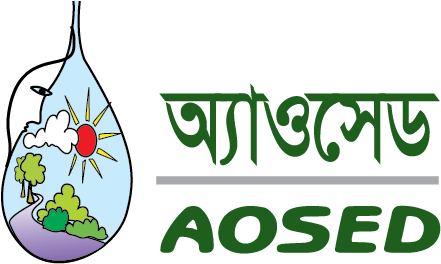Develop community-based mangrove forest conservation and management system in the southwest of Bangladesh
The southwest coastal region of Bangladesh, particularly the Kamarkhola Union of Dacope Upazila, faced significant ecological threats due to human intervention and climate change impacts. The Sundarbans mangrove forest, a UNESCO World Heritage Site and Ramsar Site, was rapidly becoming vulnerable. Factors such as sea level rise, natural disasters, reduced freshwater flow, and increased salinity were endangering the delicate ecosystem. This not only jeopardized the biodiversity of the region but also threatened the livelihoods of local communities, exacerbating poverty.
To address these challenges, AOSED initiated a project with the support of BothENDS from the Netherlands. The project aimed to enhance mangrove restoration and plantation along the riverbanks while building the capacity of local communities in mangrove ecosystem management. Through activities like household surveys, user group formation, capacity building workshops, and community awareness programs, the project sought to empower the community to take ownership of mangrove conservation and sustainable resource management.
As a result of the project intervention, significant achievements were made. Ten user groups comprising 100 members, including a substantial female representation, were formed, with 80% actively participating in project activities. Community members were equipped with knowledge and skills in mangrove and coastal ecosystem management, sustainable resource use, and restoration techniques. Additionally, 3000 mangrove seedlings of six species were successfully planted along the Bhadra River's east bank, contributing to the rejuvenation of the mangrove habitat and enhancing biodiversity in the region. Through these efforts, the project succeeded in mitigating the threats posed to the mangrove ecosystem while improving the resilience of local communities against environmental challenges.




